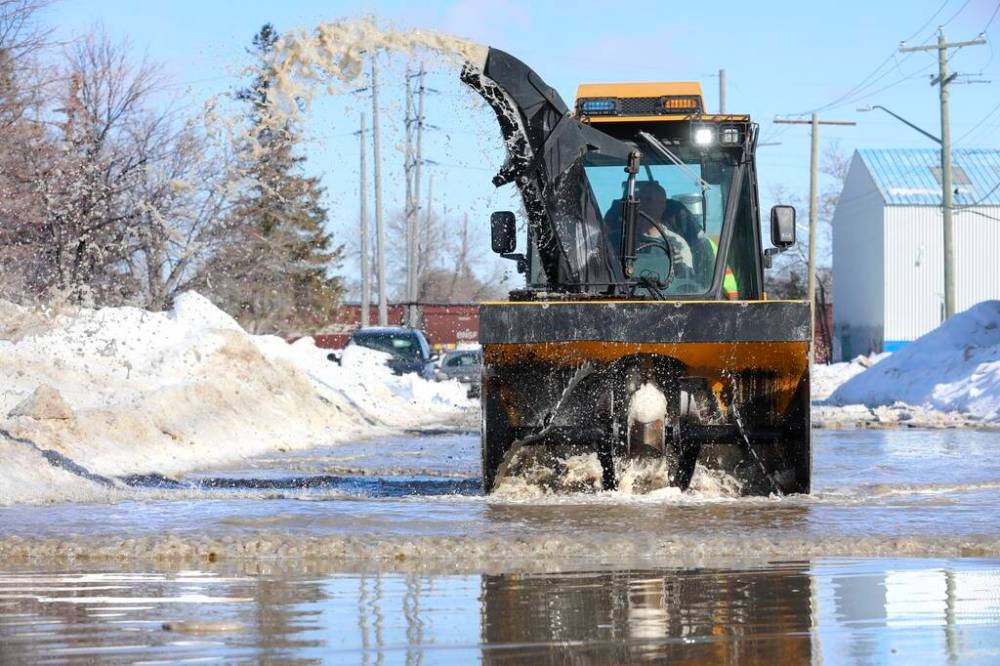City eyes expanding sidewalk snow fleet, contracts
Advertisement
Read this article for free:
or
Already have an account? Log in here »
To continue reading, please subscribe:
Monthly Digital Subscription
$19 $0 for the first 4 weeks*
- Enjoy unlimited reading on winnipegfreepress.com
- Read the E-Edition, our digital replica newspaper
- Access News Break, our award-winning app
- Play interactive puzzles
*No charge for four weeks then billed as $19 plus GST every four weeks. Offer only available to new and qualified returning subscribers. Cancel any time.
Read unlimited articles for free today:
or
Already have an account? Log in here »
Hey there, time traveller!
This article was published 27/06/2022 (911 days ago), so information in it may no longer be current.
Winnipeg’s sidewalks could potentially be freed of ice and snow more quickly in future winters — but those more passable routes would come at a price.
A proposed update to the city’s snow clearing and ice control policy calls for council to approve $3 million to buy 15 more sidewalk-clearing machines, while also contracting out an additional 500 kilometres of sidewalk plowing.
Those combined changes could reduce the plowing timeline for residential sidewalks by up to 50 per cent, or from five to 2.5 days, said Michael Cantor, City of Winnipeg manager of streets maintenance.

“This amount of equipment will provide a much better level of service than we have been able to provide so far and (allow us) to meet the policy that we have. We have a very good policy but we need the right resources to meet it.”
The changes are proposed just after the “worst case scenario” winter of 2021-22 thwarted efforts to efficiently clear sidewalks, said Cantor.
A city report notes repeated snowstorms wreaked havoc on walking paths. Municipal policy requires sidewalks adjacent to major routes and collector streets be cleared within 36 hours after an “average” storm ends, with residential street sidewalks cleared within five working days after plowing starts.
Instead, it took an average of 98 hours to clear main route sidewalks last winter, 156 hours for those on collector streets and 218 hours for residential routes.
“According to 2021-22 data, none of the priority level sidewalks or pathways were completed according to the standard set out by the policy,” the report notes.
Many Winnipeggers who rely on sidewalks for daily travel complained the routes were largely impassable for long periods, demanding the city make a greater investment to ensure active transportation options are available year-round.
Cantor said the new system, if approved by council, would provide the resources needed to meet clearing standards for the highest priority sidewalks and clear residential ones “much faster.”
“I think both the clearing and the ice control on the sidewalks will significantly improve,” he said.
The city currently owns 31 sidewalk snow-clearing machines and can rent additional ones. While the city currently removes snow from 2,500 km of sidewalks and hires contractors to clean up another 500 km, the changes would also shift a further 500 km to private crews.
The new policy would also crack down on contractors who don’t complete snow clearing on time. Fines that currently kick in for uncompleted work 36 hours after an operation starts could be applied within 12 hours of a scheduled operation instead.
The city is also calling to revamp the annual snow route parking ban, which currently bars key routes between 2 a.m. and 7 a.m. from Dec. 1 to Feb. 28. Under the new rules, the city could begin or end the ban at any point between Nov. 1 and April 30.
The ban’s name would also change, with “winter route” replacing “snow route” to highlight the fact it can be imposed to salt and sand streets, not just for plowing.
Coun. Matt Allard, who has long-called for ways to make sidewalk travel less treacherous in the winter, welcomed the proposed changes.
“I’m pleased to see it move forward. I hope that’ll be enough to meet our snow and ice control policies to have that level of service that Winnipeggers expect,” said Allard.
While the city expects to cover the $3-million tab for sidewalk clearing equipment through debt, the councillor said the investment is warranted.
“If we want to be able to walk on the sidewalks, I think we need to spend the money required to do that (in the winter). We want to encourage people to use all modes (of transportation)… This is going to be a city-wide increased level of service, so I think the value for money is definitely there,” said Allard.
The report notes new sidewalk-clearing machines may not be available next winter, since such equipment can take 12 months to obtain, thanks to COVID-19 supply chain delays.
Cantor said the city expects to contract out about 200 km of sidewalks this year, with the rest through new contracts the following year.
Council is expected to hold a final vote on the proposed changes next month.
joyanne.pursaga@freepress.mb.ca
Twitter: @joyanne_pursaga

Joyanne Pursaga
Reporter
Born and raised in Winnipeg, Joyanne loves to tell the stories of this city, especially when politics is involved. Joyanne became the city hall reporter for the Winnipeg Free Press in early 2020.
Our newsroom depends on a growing audience of readers to power our journalism. If you are not a paid reader, please consider becoming a subscriber.
Our newsroom depends on its audience of readers to power our journalism. Thank you for your support.


